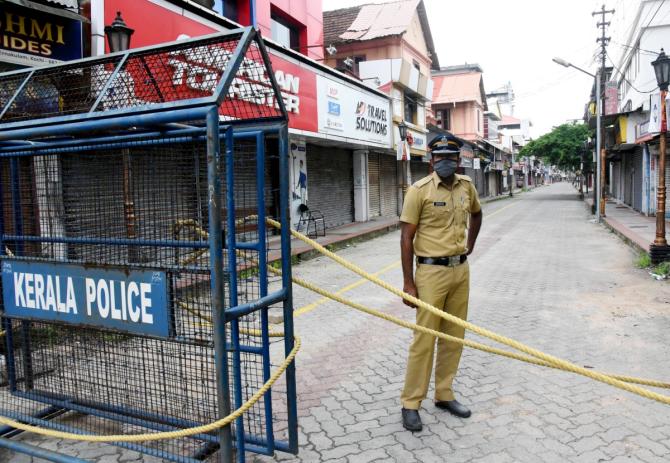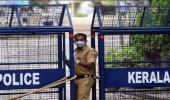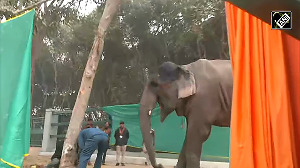College is where the manicured view of the world provided by one's family, encounters new trends.
It is the dawn of exploration.
Wishing for a sanitised bubble on campus appears hypocritical.
The correct strategy, one would assume, is to weed out the violence while retaining the right to political debate, argues Shyam G Menon.

On January 10, an old script unfolded in Kerala.
In an incident reportedly linked to campus politics, a student was stabbed to death at an engineering college in the Idukki district.
The victim belonged to the CPI-M-backed Students Federation of India (SFI); the aggressors were linked to the Congress.
The news spread quickly and before the day was out, there were confrontations between the two sides reported from campuses elsewhere in the state.
The day after the murder, there were reports of Congress offices attacked.
In the wake of the stabbing, the state's television channels broke into a rash of debates on Kerala's student politics.
Politics or no politics?
Violent campus politics with scuffles and deaths are not new in Kerala. It has been there for decades.
Articles in the media trace it back to the 1970s. That can by no means justify the trend.
It is a millstone around higher education in the state.
Almost every post-Independence generation of Keralites, who studied in the state, have their memories of aggressive campus politics; either as a witness to violence or enduring its consequences in the form of strikes, disgraced campuses, postponed classes, etc.
In general, people attribute the violence to student politics being an understudy of India's chaotic politics outside the college campus.
Parties on campus are typically extensions of mainstream political parties.
In television discussions following the death in Idukki, the leaders of major political parties were quick to argue that such incidents had reduced in number in recent years.
Irrespective of that being correct or not, the fact is, Kerala's higher educational system periodically witnesses violence.
The tradition of violence has sculpted quarters of opinion that advocate zero politics on campus.
Some years ago, even the Kerala high court ruled so -- it said that politics should be banned from college campuses, a decree, many parents must have liked.
The government of the day responded by readying a bill seeking quite the opposite.
When you dwell on it, you wonder whether it is possible to wish away politics from the campus.
To begin with, education is not a subject to be narrowly defined.
At one level, it is a system of instruction; at another, it is a broadening of thought.
College is where the manicured and protected view of the world provided by one's family, encounters new trends.
It is the dawn of exploration. It is self-defeating to argue that a wider view of the world excludes the reality beyond campus.
Second, Indian citizens become eligible to vote at eighteen years of age. And that is voting in general elections, wherein the subjects can be complex.
Ready for such issues and at the same time, wishing for a sanitised bubble on campus, appears hypocritical.
Third, life as a student is affected by dynamics beyond the campus. The overall purpose of education as decided by society, the academic fees students pay in times of education progressively privatised, the transport costs they bear to commute to campus -- all these are instances of student life affected by factors external to immediate campus.
The consequent limited scope for a political reality exclusive to campus makes the court orders questionable.
There was also the perception (likely inspired by the authoritarian tone of politics these days) that the order played into the hands of an old ecosystem -- patriarchal, favouring rule by unquestioned compliance and potentially fascist.
Its quest for control should be viewed against the backdrop of student movements (particularly in the 20th century) having been the spark for larger political and social movements. Is it right then to stifle the voice of students?

The question is where you would draw the line. There is a balance that must be struck between sustaining progression in academics and letting the outside world seep in; the need for balance is less because of any ideal ratio available out there and more due to expectations -- that of students, teachers, and parents -- being dissimilar.
There has to be a median, a point of common agreement, in the product offered.
Like that simple rule in the life of not hurting anyone -- we preserve it as a line not to cross -- violence on campus is something we try avoiding for the scale of disturbance it causes. It is the unspoken median.
Unfortunately, in Kerala, that line is crossed from time to time.
The periodic stints of violence on campus pose the state's educational system the same danger as militant labor did to industry, in the 1970s and 1980s.
Lack of industrial investment saw employment opportunities dry up.
Those of working age left Kerala for jobs in other Indian states and abroad. The state became a remittance economy.
Similarly in education, compared to the state's high level of literacy and robust school system, both of which provide a foundation for further studies, its higher education apparatus has yet to build a reputation.
Cities are known to be educational hotspots that built their aura around iconic colleges and universities.
Although some of Kerala's colleges were pioneers in the region when they started and of fine quality to boot, they haven't managed to sustain the lead.
On the other hand, volatile campus politics has taken a toll on them. It reinforces the argument of those insisting that campuses be politics-free, which as mentioned earlier, is an insular approach.
Keep politics for discussion and debate, but end the violence
The correct strategy, one would assume, is to weed out the violence while retaining the right to political debate. It has three tiers.
The first is for society to understand that campus violence is a predominantly male phenomenon and within that, there are social factors and factors concerning how young males grow up in the Malayali ecosystem.
It is part of a larger problem in Kerala -- the pursuit of self-worth and net worth, the garb of the warring male as an option, and likely therein, the lack of meaningful engagements to keep such energies occupied differently or directed towards purposes better than picking up a fight.
Let us also not forget a few other factors. Kerala's traditional social structure featured quickly marshaled fighting units and ease of access to weapons.
Vestiges of these structures and admiration for the same, continue to exist as cultural paradigms defining manhood.
Similarly, when revolutionary movements organised the less privileged and took on traditional wealth and power, they unleashed another shortcut to violence -- the strength in groups.
Finally, there is the violence of the old and new generation-moneyed featuring hired ruffians.
Simply put, violence is a social problem in Kerala. Campuses are merely one of the many arenas, where it finds expression.
We want an end to campus violence? Then, we must stop admiring violence as prized embellishment.
Second, while students may be eligible to vote in general elections when it comes to campus politics, they must remember that conduct which dents the stature of education, is as good as a captain sinking his own ship.
Once the ship has sunk, residual pictures of its claimed greatness are just that -- residual pictures.
Irrespective of what party they belong to, as they parade their capacity for violence, aggressive student leaders need to ask themselves where Kerala's higher education system (their ship) stands compared to other states in India, after decades of leadership by predecessors who projected the same instincts.
The blunt truth is, beyond the milestone of functional literacy and a relatively solid school system, Kerala's standing in education fades.
Unlike places elsewhere courted by the Keralite to study further, Kerala is not a magnet for higher studies (except perhaps where the standardised campuses of central institutes function).
Youngsters die in campus violence and become branded 'martyrs'. But they are martyrs in a higher education system already relegated as average.
If the system is not getting any better through violence, what are you shedding your blood for? Shouldn't you give peace a chance?
Finally, there is a lesson for warmongers and those given to compulsive violence, to learn from real-life war.
Barring rogue States, most major nuclear powers have committed themselves to restraint.
They may pick up disputes and small-scale conflicts with the enemy, but they consciously waltz away from escalation.
That is why treaties are signed between countries and mechanisms set up to de-escalate tensions.
We can't afford to destroy what we have. Kerala sorely needs an agreement by all political parties with a presence on college campuses, that violence will be avoided in the interest of protecting and growing the state's higher education apparatus.
Such an agreement by the parties must be matched by a commitment from college and university administrations that the grievances of students will be looked into and de-escalation mechanisms established, particularly because violence is being dispensed with.
Violence mars education; violence has periodically marred the state's higher education system. It is high time, the anomaly got corrected.
Shyam G Menon is a Mumbai-based columnist.
Feature Presentation: Rajesh Alva/Rediff.com










 © 2025
© 2025